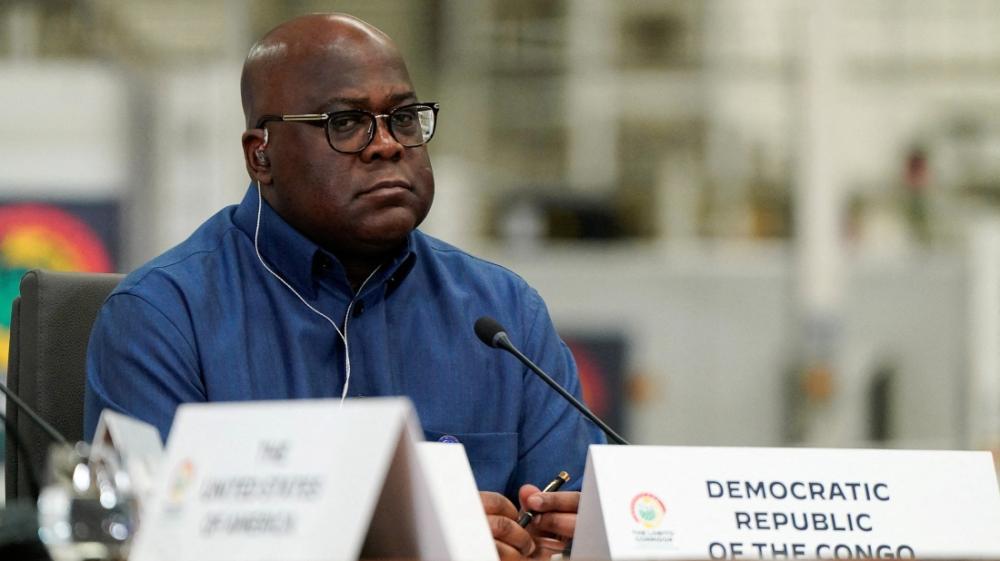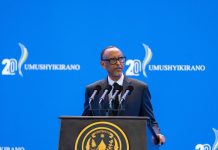Tom Ndahiro
Africa-Press – Rwanda. The quality of leadership is often measured by competence, integrity, and the ability to make sound decisions under pressure. Leading a nation is not an arena for mere ambition or accidental ascension, but a position requiring deliberate preparation and proven capability.
A nation’s future depends on the individual who sits at the helm of its governance. If that individual lacks responsibility, vision, and honesty, the entire country suffers the consequences.
The case of Félix Tshisekedi, from his days as a struggling pizza delivery worker in Belgium to his disastrous tenure as the President of the Democratic Republic of Congo (DRC), is a textbook example of why leadership should not be entrusted to those who lack the discipline and integrity to govern effectively.
Political pundits must analyze such cases carefully to understand how individual behavior, character, and past performance are indicators of future governance. The failure of Félix Tshisekedi as President of the DRC is not an isolated political accident; it is a reflection of a broader principle—how personal irresponsibility and dishonesty can scale into national chaos when such an individual is placed in power.
The man who once struggled to deliver pizzas in Brussels and now struggles to deliver governance in the DR Congo, serves as a lesson in why evaluating a leader’s past is critical to understanding their potential for national leadership.
A Leader’s Character Is Built Long Before Power
In a Belgian Le Soir article published on June 7, 2024, Francisco Piscopo, the owner of Pizzeria Godo in Brussels, recalled his time employing Félix Tshisekedi for three years. His assessment of Tshisekedi’s performance was strikingly similar to how the President runs the DRC today:
“He runs Congo the same way he delivered pizzas: always late, disorganized, and with missing funds that no one can explain.”
This brutally honest observation encapsulates the very essence of leadership failure. Tshisekedi, who once struggled to deliver pizzas on time, now struggles to deliver governance, peace, and economic stability to one of Africa’s most resource-rich nations.
His disorganization and lack of accountability were not new developments—they were simply amplified by the power he was given.
If a man cannot handle a pizza delivery route with responsibility and efficiency, how can he be expected to run a country of 100 million people? The trajectory of Félix Tshisekedi’s presidency confirms that early indicators of incompetence should never be ignored.
The importance of scrutiny in leadership selection is of utmost importance. Piscopo’s final piece of advice to his former employee was simple but damning: “If I could give him one piece of advice, it would be to take his responsibilities more seriously. I have love for this boy.”
Unfortunately, Tshisekedi never took responsibility seriously, not as a pizza delivery worker, and certainly not as the leader of a nation with nearly 100 million people.
For students of political science, the case of Félix Tshisekedi presents a textbook example of why leaders must be judged on more than just their rhetoric or family name. Competence and integrity are not qualities that suddenly emerge once one assumes office; they are habits cultivated through a lifetime of responsibility.
Serious countries do not hand over their future to men whose track records suggest habitual carelessness. Yet, in the DRC’s political landscape, a man with no prior experience in governance was catapulted into power through a backroom deal with Joseph Kabila, who sought to maintain control behind the scenes. The result? A leader who runs the state like a lost deliveryman, scrambling from crisis to crisis with no coherent direction.
A Presidency Defined by Incompetence, Corruption and War
From the moment he took office in 2019, Tshisekedi’s leadership has been marred by empty promises, failed governance, and reckless decision-making. While other nations were working toward economic stability and regional peace, he was busy playing political games, fueling internal conflicts, and waging a war he could not win.
Instead of focusing on development and infrastructure, his presidency has been characterized by:
An Unchecked Security Crisis: Tshisekedi’s obsession with war has led him to arm various militia groups, including the genocidal FDLR and the so-called Wazalendo. His decision to legalize these armed factions and invite foreign mercenaries has turned eastern DRC into a battlefield.
He outsourced national security to Burundi, SAMIDRC, MONUSCO, and other foreign actors, instead of building a capable national army.
For a leader with even the most basic grasp of security strategy, working with Rwanda to dismantle the FDLR—a group comprised of remnants of the genocidaires responsible for the 1994 Genocide Against the Tutsi—would be a logical step. But Tshisekedi, driven by paranoia and an irrational obsession with “regime change” in Rwanda, has done the opposite.
A War on Rwanda Instead of Peace at Home: Rather than seeking diplomatic solutions to the DRC’s conflicts, Tshisekedi invested heavily in a senseless strategy of “regime change” in Rwanda. Billions of dollars were wasted on weapons and ammunition for an “Armageddon” against Rwanda, an absurd idea that ultimately failed. Instead of seeing the FDLR as a terrorist group destabilizing both Rwanda and the DRC, he chose to ally with them, exposing his own people to further violence.
Refusal to Negotiate for Peace: The M23/AFC rebellion in eastern Congo is a direct consequence of the DRC government’s failure to address the grievances of Congolese Tutsi communities. Tshisekedi’s refusal to negotiate with M23/AFC is not because he believes in a military solution—it is because peace would mean losing his cash cow. The war fuels corruption, allowing those close to him to benefit from military contracts, foreign aid, and emergency funding.
Tshisekedi has surrounded himself with known supporters of genocidal ideologies, including Charles Onana, Jambo Asbl, and Congolese figures such as Justin Bitakwira, Martin Fayulu, Denis Mukwege, and Constant Mutamba. These individuals propagate hate speech, distort history, and use their influence to justify continued violence.
Tshisekedi’s government is riddled with financial scandals, including missing public funds, mismanagement of international aid, and exploitation of the country’s vast mineral wealth for personal gain. Just as his former employer noted that money often went missing when Tshisekedi was delivering pizzas, the same pattern has emerged in his handling of state finances—except now, it is billions of dollars that are unaccounted for.
Broader Lesson for Political Science Students
Tshisekedi’s presidency is not just a Congolese problem; it is a global lesson in governance failure. Political science students must understand that leadership is not about luck, slogans, or political alliances—it is about capability, integrity, and responsibility.
The key takeaways from his disastrous leadership include:
One, a leader’s past behavior predicts their future governance. Tshisekedi’s failure in small tasks as a pizza delivery worker was an early warning sign. Leadership is a habit formed over time, not a sudden transformation upon assuming office.
Two, leadership requires more than a famous last name. Tshisekedi was handed power due to his family name, not because of his skills or vision. Political dynasties often produce incompetent leaders when merit is ignored.
Three, incompetence at the top leads to national chaos. A country led by an incompetent leader will experience widespread disorder. His mismanagement of the military, the economy, and diplomatic relations has left the DRC weaker than ever.
Four, integrity is the foundation of good governance. A deceitful person in a position of power will amplify corruption. Just as Tshisekedi mismanaged small sums of money in a pizzeria, he has now mismanaged billions in state funds.
Five, a nation’s future depends on who it elects to the highest office. The people must scrutinize a candidate’s past before voting. If someone is irresponsible in their personal or professional life, they cannot be expected to manage a nation successfully.
From Pizza Boxes to War Zones
Leadership is not merely about occupying the highest office; it is about understanding the weight of responsibility. Tshisekedi, however, has demonstrated that he lacks the temperament and strategic foresight needed to lead a nation in turmoil.
First, the country has experience catastrophic mismanagement and the descent into chaos. Since taking office, his economic policies are erratic, his development projects non-existent, and his promises remain largely unfulfilled. Instead of fostering a stable political and economic environment, he has transformed the DRC into a battleground by creating conditions that exacerbated conflict.
Secondly, his decision to distribute weapons to untrained militias under the so-called Wazalendo initiative has ensured that an already volatile region spirals further into lawlessness. An intelligent president understands that arming civilians is a recipe for long-term instability. Yet, Tshisekedi, in his characteristic recklessness, took this dangerous path—further proving that he lacks the discernment needed to govern.
Thirdly, the “Armageddon” plan was a war based on hatred and delusion. Rather than governing, Tshisekedi spent billions of dollars on an impractical military campaign aimed at toppling Rwanda’s government. This so-called Armageddon plan, an ill-conceived fantasy, has drained the DRC’s resources, leaving its people impoverished while its leader chases an imaginary victory.
Lastly, a capable leader understands the limitations of his military and the geopolitical realities of his region. Yet, Tshisekedi has ignored all rational assessments, choosing instead to align himself with individuals and organizations that peddle genocidal rhetoric.
His associations with figures such as Charles Onana, Justin Bitakwira, Martin Fayulu, Denis Mukwege, and Constant Mutamba—who fuel anti-Tutsi and anti-Rwandan narratives—illustrate his reliance on dishonesty and scapegoating rather than leadership.
Why Tshisekedi Won’t Negotiate Peace
A crucial indicator of Tshisekedi’s lack of statesmanship is his refusal to negotiate with M23/AFC. Any leader genuinely interested in peace would explore dialogue, yet Tshisekedi sees war as a financial opportunity. His government benefits from defense contracts, military aid, and international sympathy—resources that would dry up if peace were restored.
This is the same pattern of behavior Francisco Piscopo noticed in his pizza business. Just as Tshisekedi could not be trusted to deliver orders properly or account for missing funds, he cannot be trusted with state resources or the lives of his people. The same dishonesty that plagued his small-time job in Brussels is now destroying an entire nation.
The Cost of Unqualified Leadership
The DRC’s current crisis is not simply a matter of bad policies—it is the result of placing an unprepared man in power. Political science students must take this case as a sobering reminder of why leadership selection matters.
Past Behavior Predicts Future Leadership: The warning signs were always there. Tshisekedi’s disorganized work history, lack of professional achievements, and history of unreliability were all clear indicators that he lacked the discipline for governance. Political aspirants must be scrutinized in every phase of their life because a person’s past behavior often dictates how they will perform in office.
A Nation Cannot Afford Leadership Experiments: The DRC is paying the price for treating leadership as a family inheritance rather than a position that demands proven competence. Tshisekedi was not elected for his vision or capability; he was installed through a deal. This lack of merit-based selection has left the country in turmoil, proving that nations must be extremely cautious when choosing leaders.
Integrity is Non-Negotiable in Leadership: A dishonest pizza deliveryman became a dishonest president. Tshisekedi’s governance is riddled with deceit—from rigging elections to fabricating military victories and squandering public funds. Leaders without integrity cannot inspire trust, and without trust, no government can function effectively.
The DRC Deserves Better
The DRC is not an insignificant country. It is one of the wealthiest nations in terms of natural resources, with immense potential for development and prosperity. However, under Tshisekedi’s thoughtless leadership, it has remained trapped in conflict, poverty, and international ridicule. DRC has been burdened with a president whose careless and dishonest character was evident long before he took office.
Leadership matters. A nation’s fate is often sealed by the character of the person at its helm. Leadership is not about titles or political slogans; it is about responsibility, vision, and the ability to make tough decisions for the greater good.
A person who cannot deliver a pizza responsibly should not be trusted to deliver a nation’s future. The DRC is paying a heavy price for ignoring this fundamental truth.
Source: The New Times
For More News And Analysis About Rwanda Follow Africa-Press






